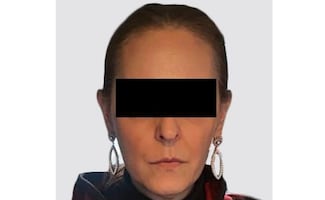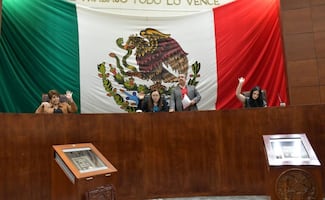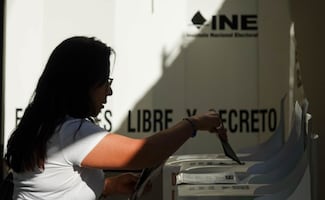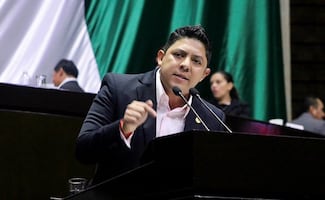Más Información

PRI en el Senado propone prohibir entrega de doctorados honoris causa sin rigor académico; pide honrar méritos comprobables

Dictan prisión preventiva a exasesora de García Luna por delincuencia organizada; falta definir su vinculación a proceso
People called her “dangerous,” “unreliable” and even a “mason.” She did not care and became the first Mexican woman to study at the National Preparatory School (ENP) and then she spoke to the President himself to be allowed to study Medicine.
Her name was Matilde Montoya and she was the first Mexican woman who was able to study Medicine.
In 1882, Matilde Petra Montoya Lafragua was the first woman to study at the ENP, which was located in what we know today as the San Ildefonso College.
Matilde’s academic journey was far from being easy.
Matilde was born on March 14, 1859, in Mexico City. She was the third daughter of the Montoya Lafragua family but she was raised as an only child for her older brother lived with their grandmother and her sister died at an early age.

Matilde was brought up by her mother, Soledad Lafragua, whose husband, José María Montoya, according to the times, forbade her from leaving her house, so she was completely focused on taking her of her daughter.
Hence, Soledad taught Matilde to love reading from a young age since the little girl learned how to read and write when she was four years old. Her father could not understand his daughter’s eagerness to learn and he deemed her education irrelevant. Nevertheless, he accepted to enroll her at a private school when Matilde was not able to join the High Elementary School – equivalent to today’s junior high school – due to her young age at 11 years old.
Recommended:
At 13 years old, the fearless Matilde presented the exam to become an elementary school teacher and although she approved without a single problem, her age was an obstacle once again for her to obtain the post.
After her father’s death, Matilde took her first try to study medicine, but since she could not afford it she had to abandon it. Then, she enrolled at the Midwives and Obstetricians School of the Maternity House, a place that was known for treating single mothers.
When she was only 16 years old, she obtained her Midwife qualification and immediately began working as a surgeon auxiliary. Her objective was to increase her knowledge in Anatomy for she had only learned things related to the female reproductive system. In addition, she concluded her high school studies at private schools for women.
When she was 18 years old, she moved to Puebla, where she quickly got clients, causing some practitioners to launch a smear campaign against her and several local newspapers published articles suggesting people not to request the services of “such an unreliable woman.”
Then, Matilde moved to Veracruz to free herself from the exhaustion caused by the attacks. Although it seemed that she had recovered her strength once she returned to Puebla because she requested to join the state’s Medicine School to study Chemistry, Physics, Zoology, and Botanics.
After the public event in which she was accepted – which was attended by the state governor, important lawyers, and teachers, her opponents increased the attacks against her with more news saying things like “an indecent and dangerous woman pretends to become a doctor.”
Recommended:
That was when Matilde decided to return to Mexico City and tried to make her dream come true yet again. She requested, for the second time, to join the National School of Medicine. She was accepted by principal Dr. Francisco Ortega in 1882 awhen she was 23 years old.
First, she had to face economic limitations and then to the sexist society of the time that attacked her even in newspapers.
When she was finally able to enroll at the ENP, she was mocked and insulted by some members of the school community up to the point in which some professors and students tried to halt her efforts to become a surgeon .
Teachers and students asked the school to go over her file to verify the validity of her high school subjects and she was removed from the school. Although she asked authorities to allow her to study those subjects at San Ildefonso on the afternoons, her request was denied for only male students were mentioned in the rules.

When her schoolmates made the university remove her and prevent her from attending classes for five high school subjects authorities claimed made her education not valid, Matilde Montoya decided she would not give up and wrote a letter to President Porfirio Díaz asking for his help to be allowed to continue studying.
Upon receiving the young woman’s letter, the President “ordered the Public Illustration and Justice Minister, Joaquín Baranda, to suggest the principal at San Ildefonso to allow Montoya to study the missing subjects. The principal had to accept,” as published EL UNIVERSAL back then,
Recommended:
Mexico's first female doctor
concluded her education, prepared her thesis, and requested to perform her professional examination. Once again, the ENP statutes became an obstacle for it only mentioned “male students” could present the tests. Matilde wrote another letter to Porfirio Díaz.
Her perseverance made the President issue a decree to change those statutes so that women could also obtain a degree in case they fulfilled the requirements of a theoretical and practical exam in front of an academic jury.
She had to present her professional examination in front of the most strict professors and eminent doctors of the time: José G. Lobato, José Bandera, Nicolás Ramírez de Arellano, Tomás Noriega, and Manuel Gutiérrez.
At first, people tried to hold Matilde’s exam in a room that was not as solemn and prestigious as the usual one, however, some minutes before the beginning of the exam, a messenger announced President Porfirio Díaz would attend the exam along with his wife Carmelita and some friends. Therefore, she was allowed to present her exam at the events room. The exam lasted for two hours and complied with all the rules.
Matilde answered all the questions correctly and was unanimously approved.
The next day, she presented her practical exam at the San Andrés Hospital. This time, the President’s secretary and the Interior Minister Manuel Romero Rubio attended the exam.
Newspapers reported Matilde was extremely nervous that day but was able to calm down and continue with the process. When she was informed she had become the first Mexican woman to get a degree in Medicine at the School of Medicine, Matilde immediately fainted. Luckily, her friends were able to help her and she then listened to the words poet María Argumedo de Ortiz had prepared to congratulate her.
Recommended:
IIn 1925, Matilde Montoya founded, along with Dr. Aurora Uribe, the Mexican Association of Female Doctors .
About her personal life, it is known that she did not get married but adopted four children. She passed away on January 26, 1938, at 79 years old.
Her whole journey was worth it for, perhaps without being aware of it, she also created a path for hundreds of Mexican women that could now follow her academic steps in a time when Medicine was considered a field exclusive for men.
It was until 1957 when Dr. Rosario Barroso Moguel became the first woman to enter the National Academy of Medicine. The second woman was accepted until 1965, Dr. Julieta Calderón de Laguna and in 1973, Dr. María de la Soledad Córdova Caballero was the third woman to be accepted. In 2016, 621 women got their medicine degrees at the National Autonomous University of Mexico (UNAM).
According to Mexico’s Public Education Ministry, in 2017, a total of 77,067 women enrolled in Medicine while 9,759 women got their degrees in medicine that year.
Recommended:
mp
Noticias según tus intereses
[Publicidad]
[Publicidad]











